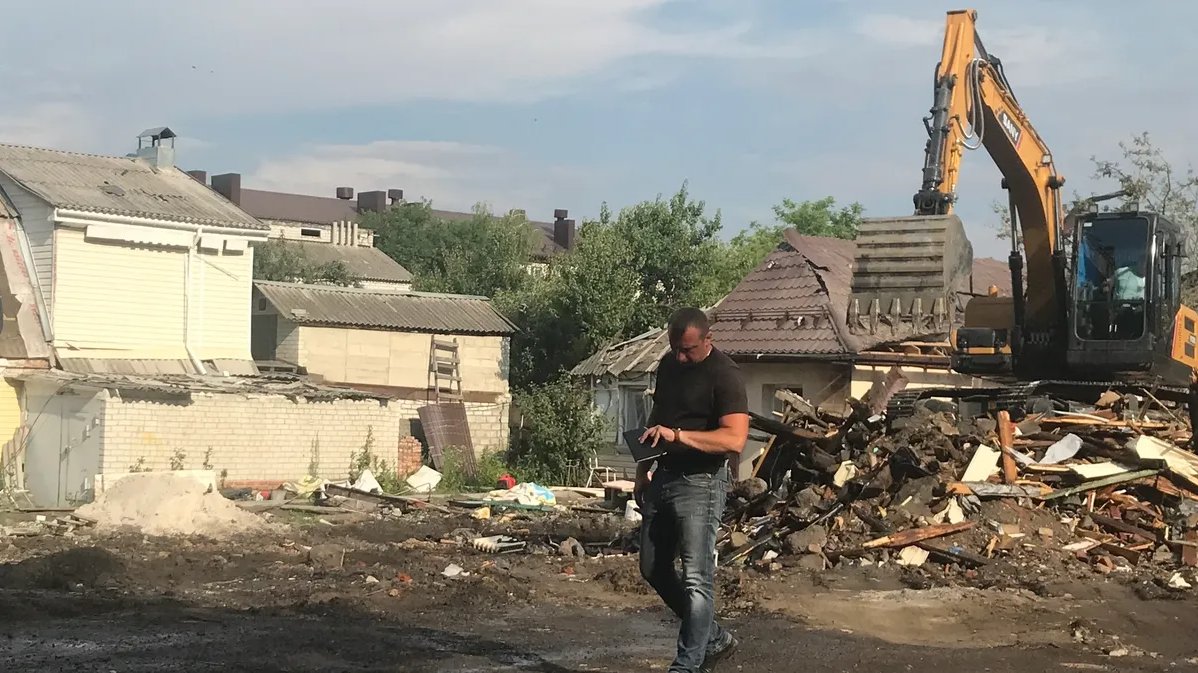Unimaginable thunder in the middle of the night ejects you from your bed. It is banging somewhere nearby. Another blast. And yet another. Your child is running out of his room, you take him into your arms and start counting seconds before another burst. And what else can you do? Where can you run? You are sitting on the bed and counting: five, six… A blaze outside the window, the neighboring house is on fire. Another burst, and burning pieces of roof tiles hit your window and shatter the panes. Your child is screaming…
Some residents of Belgorod experienced this in early July. Before that, they had heard about such things only from their relatives in Ukraine. And they did not believe them. They argued with their kin living under shellfire. Tried to explain to them that such things can happen only in wartime, but there was no war. When rockets struck a neighborhood in the very heart of Belgorod, killing several people and destroying numerous homes, it seemed like that would be a breaking point and that those who parroted the TV saying that "everything is going according to plan" just the day before should finally have a moment of clarity and feel in the shoes of those who earlier found themselves to be part of the mad 'plan'. Novaya Gazeta. Europe tried to find out what is actually happening in Belgorod, now a frontline location, once considered the most 'Ukrainian' city in Russia.
“Ukraine has started targeting our homes”
A community of single-family homes in the very center of Belgorod is surrounded by apartment blocks, standard schools, and shopping centers. In the early hours of July 3, a supposedly Ukrainian rocket was supposedly intercepted by a Russian air defense system over Belgorod, and the debris fell onto the community's section between Mayakovsky Street and Chumichov Street. A small annex on one of the lots was ruined completely by a direct hit. Four people (a woman, her daughter, son, and elderly mother) were inside it at the moment. All of them were refugees from Ukraine's Kharkiv. All of them were killed. The next strike hit the main building on the same lot, killing a man. All of them were members of the same family.
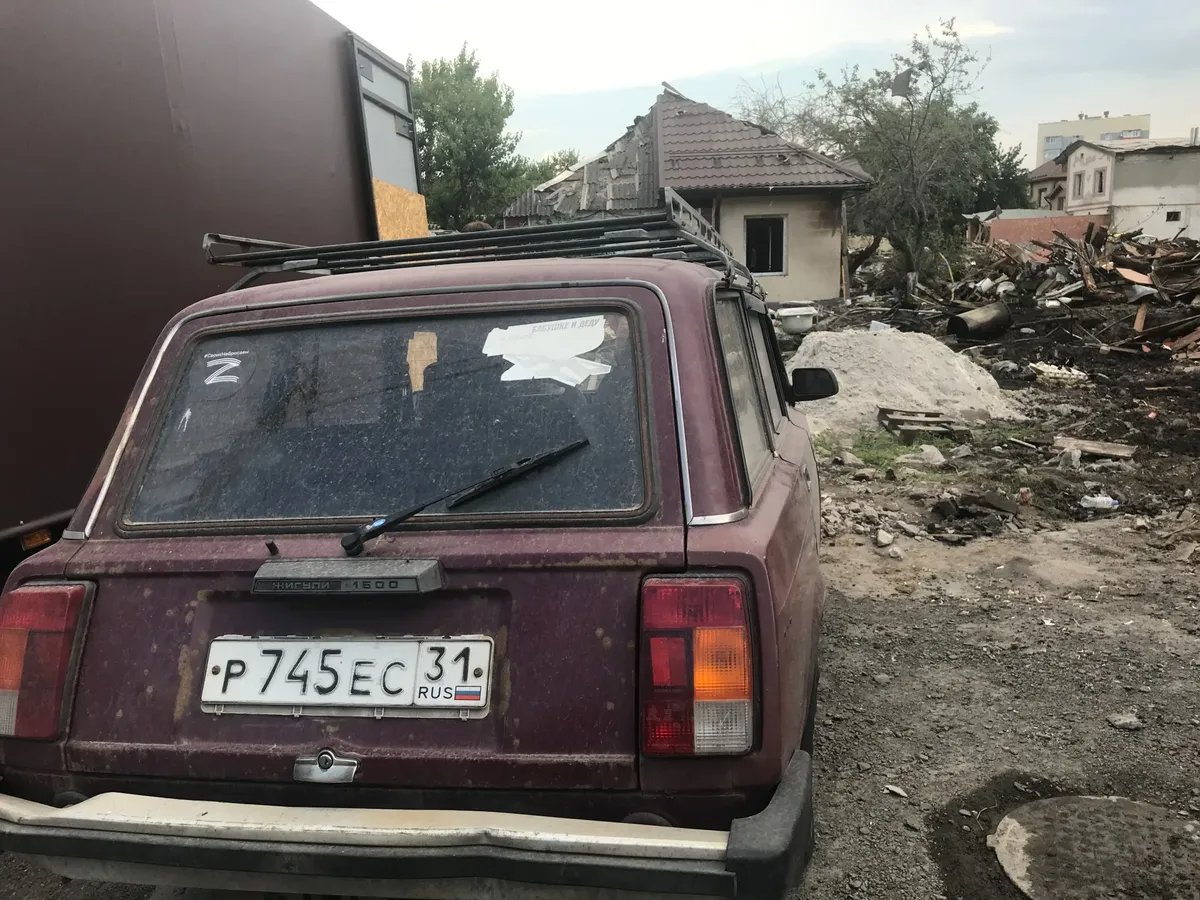
In front of the house of the deceased family. Photo: Irina Tumakova
“Oleg Olekseyenko had moved to Belgorod from Kharkiv a few years ago, he already had Russian citizenship,” says Yevgeny Bakalo, head of the Tenth Circle volunteer organization. “Here he created a new family, a wife and her ten-year-old son. They had bought a house with an annex on Mayakovsky Street. When the hostilities began, Oleg evacuated from Kharkiv his first wife with the kids, a son and a daughter, as well as his former mother-in-law and their cat and dog. He accommodated them in the annex. We saw the conditions in which they lived there, they were okay.”
Volunteers from the Tenth Circle helped Olga Olekseyenko. She did not want to live for too long side-by-side with her former husband's new family and planned to move further on. Olga was apparently planning to leave soon, because she'd asked the volunteers to help her find a carrier for the cat on July 1. Their annex was struck by a rocket early on July 3.
“Oleg, his wife, and his stepson stormed out of the home and saw that there was no annex anymore. Then a new strike, this time around upon the main house. Oleg shielded his stepson with his body and died himself. His wife was not hurt, and the child was taken to the hospital with head and eye injuries,” says Yevgeny Bakalo.
None of Oleg's neighbors were hurt, but eleven other buildings were damaged beyond repair. They are going to be demolished. When I came, the owners of those homes were collecting and loading their survivals onto trucks and digging out plants in their gardens they wished to take away with them.
“We‘ve been designated for demolition,” says a woman trying to save a flowerbed in front of the ruined house. “It seems fine from the outside. But there’s no roof. And its whole geometry has been distorted. They promised us to rebuild everything. I am going to live with my children for now.”
Her neighbor, Valentina Vasilyevna, motions me to take a look at her property. Her family also has two houses on the same lot, both of them were damaged badly, and the administration also decided to demolish them. Valentina Vasilyevna's husband is sitting on the porch of one of them and staring fixedly in front of him. A metal door smashed and warped by the blast is leaned against the wall beside him.
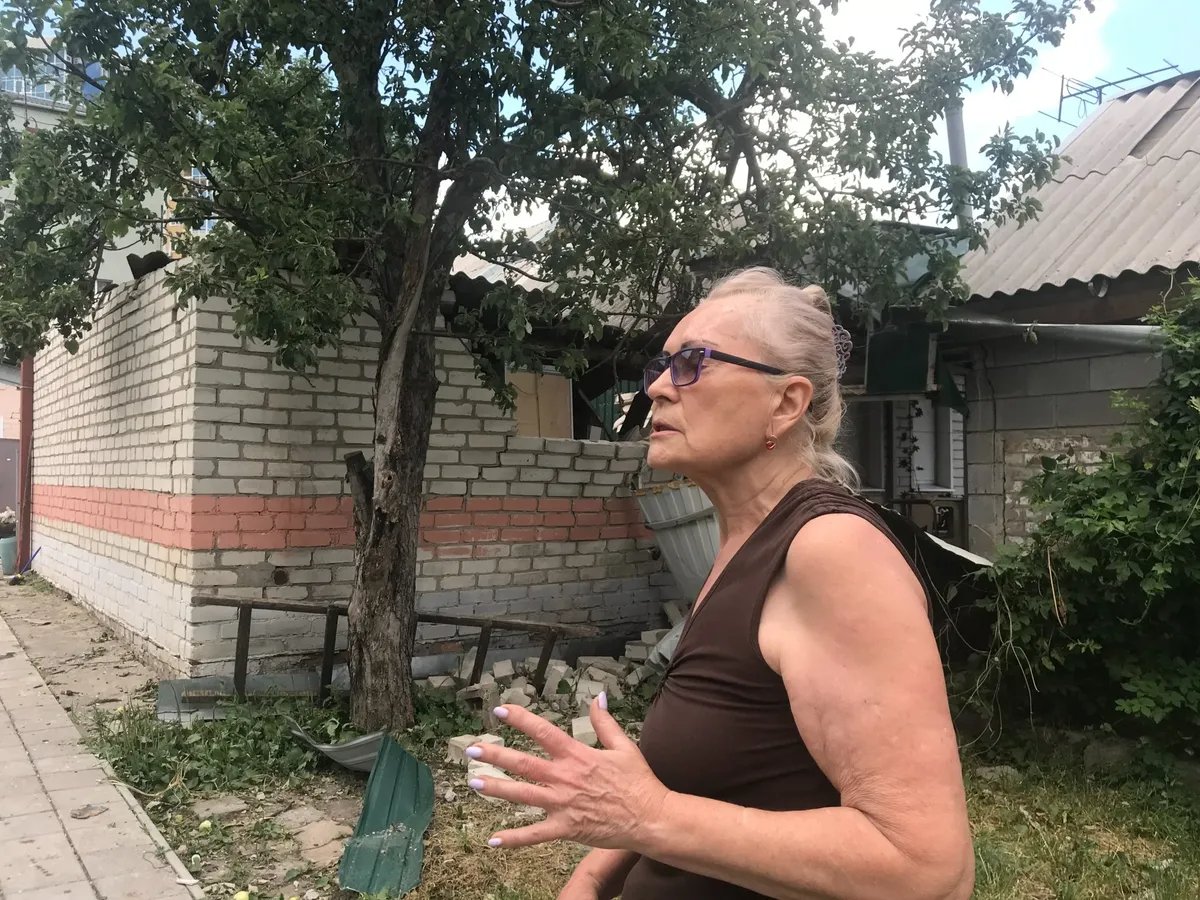
Valentina Vasilievna is the mistress of the destroyed house and outbuilding. Photo: Irina Tumakova
“I only heard my granddaughter screaming, ‘Where are we supposed to live?’ She screamed so terribly, tears still well up in my eyes when I recall that,” he says, without looking up.
“Take as many pictures as you like, let everyone know that this can happen to anyone now. Just be careful, something else can still fall down from above there. Everything is burned away, even iron,” says Valentina Vasilyevna.
"And the garden! We had a blooming garden here. Now everything is turned upside down, everything is burned away and broken, everything is peeling off. We've lived here for 37 years. Our children and grandchildren have grown up here. And imagine how much we've invested here!
We have just replaced the windows and changed the wallpaper. And all of that is in tatters now. And what a garden our neighbors had! All's gone now. They'd already had this big pomegranates, and they harvested walnuts in buckets."
She is speaking fast, as if mechanically, and guiding me towards their second home. Looking inside it, I could see that everyone who stayed there went through hell.
“We were at home that night, we live here, both our family and my son's family,” Valentina Vasilyevna swallows the lump in her throat. “We were in that house, and our grandson and granddaughter, 11 and 7 years old, were sleeping here. Plus our son with his wife. They were just quick enough to carry the kids out from the upper floor before everything crashed down. We heard a rocket whizzing past and then a loud boom. I was running like hell, I wanted to take the dog away so that it shouldn’t be scared. I ran out, and then something began to rain down on me, I couldn’t even realize what was happening. My husband didn’t understand anything at all.”
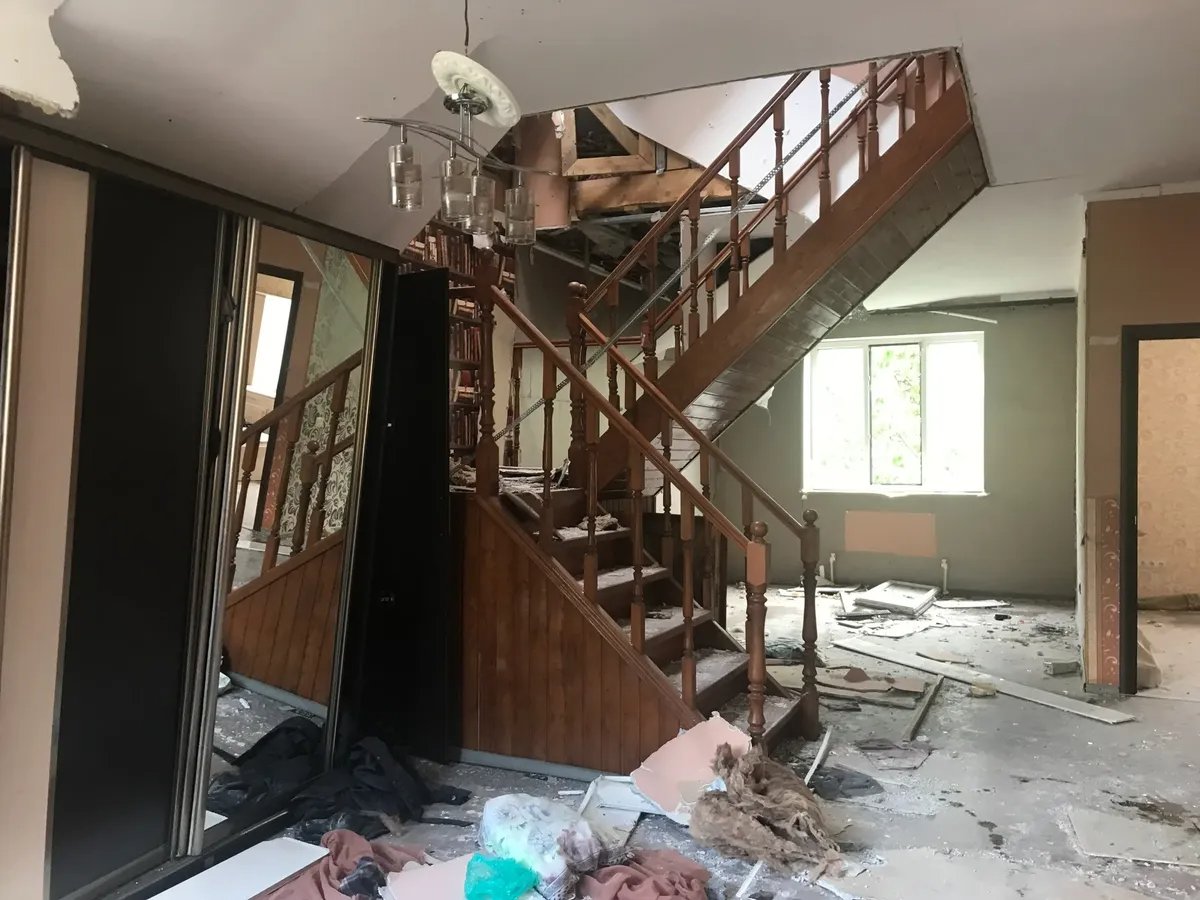
Inside the house of Valentina Vasilievna. Her grandchildren and their parents slept here. Photo: Irina Tumakova
The next house is also marked for demolition.
“How long have we been living here?” Antonina Nikolayevna, its owner, asks herself, keeping on taking her belongings outside. “Since 1972. Then it's fifty years, right? Now they told us to take everything out and leave, because the house will collapse anyway.”
Her son Alexander has arrived to help her.
“Only the roof jumped a bit in our home,” he says, wondering why it needs to be pulled down. “If you take a stroll along our lane, you'll see that our home looks pretty well. But the garage is ruined completely.”
Other houses had their windows smashed and roofs punctured by shrapnel. Venera and the two of her dogs live on the very edge of the community. When everything was rattling and crashing around her, Venera was simply sitting with her eyes closed and hugging her dogs.
“I woke up at three or three something in the morning. From loud pops. We‘d had pops here before, when the nearby settlements were shelled, but I’d never heard such horrible ones before. My dogs started barking, and so I got up thinking I had to calm them down. And at that very moment, chunks of the ceiling fell down right onto my bed. I looked out of the window and saw a blaze. And that‘s when I realized that it’s my home and my whole life were falling apart. Then I was simply sitting with my eyes closed and waiting for more blasts. Then I heard my neighbors ran outdoors. I saw black smoke, someone's home was burning.”
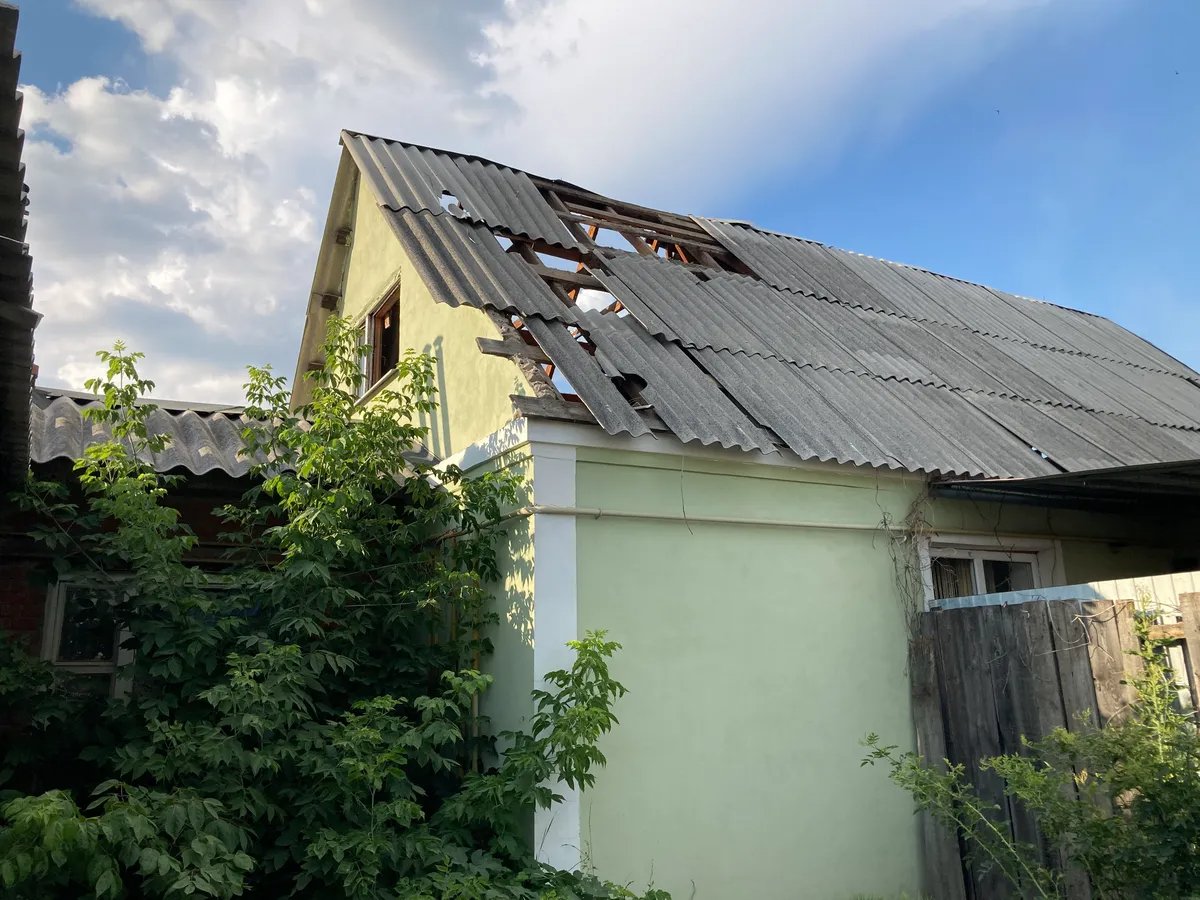
Roof of the house of Venus. Photo: Irina Tumakova
“All of the frames of my mom's balcony were wrecked. We live nearby, but it appears that the neighboring nine-story building shielded us. We have two windows on the same side, one of them was twisted, and the other is okay. Of course, we were scared. I understood that our territory was being shelled. That is, Ukraine has started targeting our homes now,” says Olga.
Beyond the fence surrounding the community, in the courtyard of a brick five-story apartment block with its windows nailed up with drywall and plastic film, there is a playground with a slide and a sandbox, where “Pasha-boy,” as he solemnly introduced himself to me, is playing with a toy dump truck.
“Mom and I were scared and ran out of our bed,” he excitedly tells me about the night adventure. “Dad fixed the latch, and our glasses fell down. It wasn't scary. That is… It was scary.”
Two senior men and a woman are sitting on a bench near the entrance to the apartment block. Nikolai Pavlovich's “children live in another city,” and yet he is not planning to move there.
“Those people had fled from Kharkiv to Belgorod, and what of that?” he nods at the ruined houses. “They thought they could‘ve been killed there, and yet they ended up getting killed in Belgorod. Everything is in God’s hands.”
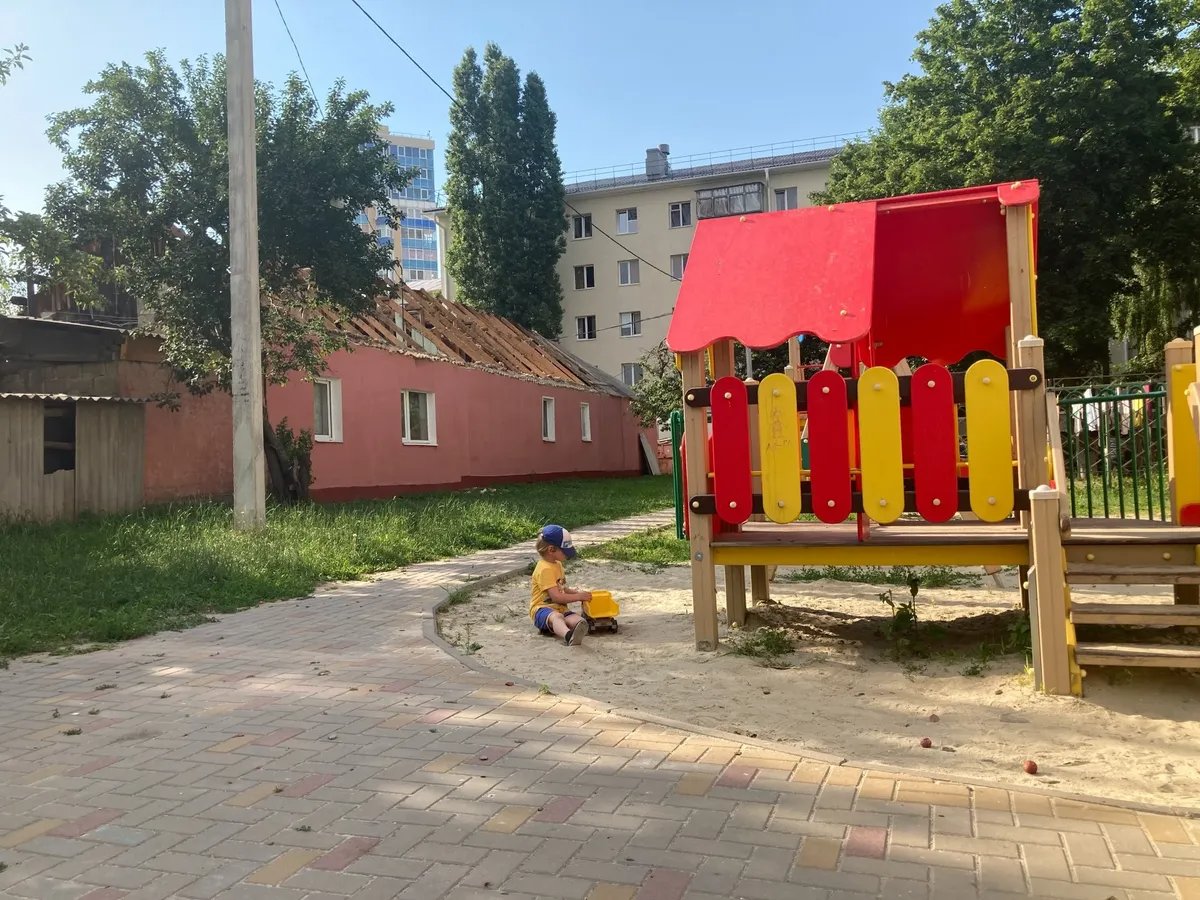
Pasha. Photo: Irina Tumakova
“Those were neighborly relations”
Belgorod used to be the most 'Ukrainian' among the Russian cities. Only 80 kilometers away from Kharkiv, an hour and a half's drive. Belgorod residents had so frequent and close contacts with their neighbors across the border that they must have known Ukrainians like close relatives. In fact, many were relatives to each other indeed.
“Half of the city dwellers here have relatives in Ukraine. Half of Belgorod residents studied in Kharkiv. And lots of Ukrainians, on the other hand, studied and stayed here, while still having parents there. We have always wonderfully travelled to Kharkiv for shopping, bringing home various appliances and clothes. Prices were far lower there,” Olga says.
Volunteer Yevgeny Bakalo lives in the village of Politotdelsky, which is even closer to Ukraine. There is a Russian checkpoint on the highway right outside of the village. It is a mystery why it is there, for that is not the border yet. But when I tried to take some pictures near the checkpoint, a man in a camouflage uniform scrutinized my phone for half an hour and then erased all pictures from it. And it is good that I was prepared for such incidents in principle.
Politotdelsky is one of those Russian villages that had occasionally been shelled from the Ukrainian side even earlier.
“A Ukrainian Grad rocket landed a couple of hundred meters away from my home. Troops are stationed in our village. There is a creamery where I used to work, it is closed now, and the warehouses behind it have been occupied by soldiers. But there have also been strikes both farther away from our village and closer to the border,” says Yevgeny.
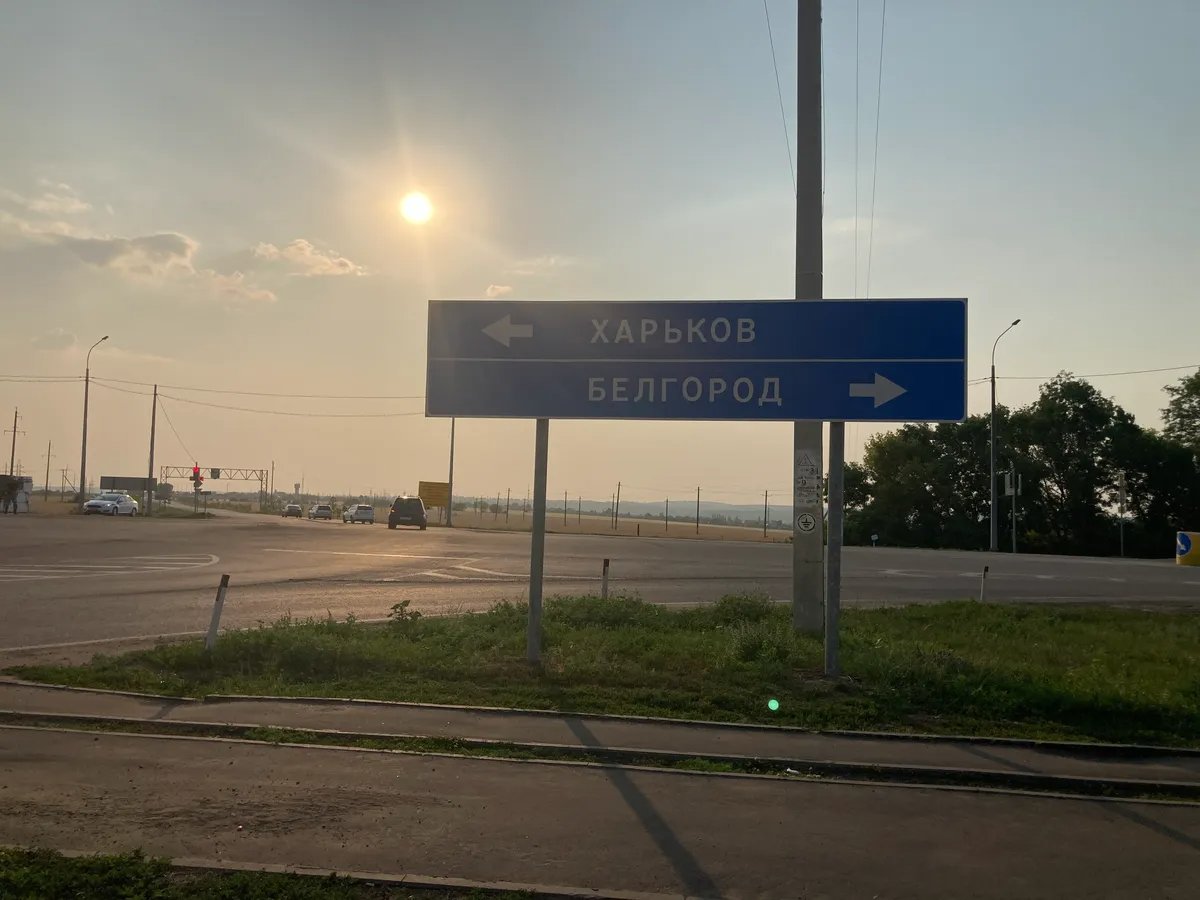
Near the checkpoint on the road to Ukraine. Photo: Irina Tumakova
When there were neither airstrikes nor checkpoints, Yevgeny used to travel to Kharkiv, as he says himself, even to buy bread.
“The best known and the largest shopping mall in Kharkiv was Caravan. It took me 40 minutes to drive there from my home,” he says.
If what Ukrainian publics are saying is true, Caravan is still partially functioning, even though it was struck by a Russian precision-guided rocket in April.
Before the war, many people from Belgorod habitually travelled to Kharkiv to take a rest and have some fun, go to a restaurant, or shop. Elsewhere in Russia, people travel this way to Moscow, St. Petersburg, or the nearest metropolis. Belgorod residents had the cultural capital of Ukraine for that purpose. They travelled there to go to concerts or drama theaters, where actors performed in Russian.
Alexander, a doctor, has relatives living near Vovchansk in Ukraine, right near the border with Russia.
“My grandmother's sister lived in Shebekino, which is in the Belgorod region,” he says. “Then she got married and moved to a neighboring village. And then the Soviet Union ceased to exist, and that village near Vovchansk ended up abroad. But people still kept visiting each other from one village to another. And my grandma would visit her sister across the border. She even forgot to carry her passport with her sometimes.”
For Belgorod residents, Ukraine was like a gate to Europe, Alexander says.
“We liked people in Kharkiv very much. You ask the way, and not only do they show but also guide you, or even give you a tour. Therefore, we felt here, in Belgorod, freer than some do elsewhere in Russia. You need to update your wardrobe, or you want to go to a concert, you drive to Kharkiv, and that's it.
With our salaries, we felt like millionaires in Ukraine. Five thousand rubles was enough for a company of five to vacation a whole weekend there,” he says.
Nikita Parmenov is a journalist, and he has observed the economy of his own region and the life of its neighbors for years.
“The two cities, Belgorod and Kharkiv, were always deeply integrated into one another. Ukrainians brought their goods to our markets, they weren’t liked here for knocking down prices, but all of that was in a pretty neighborly way. Our own products were more expensive and of a poorer quality, and therefore, local vendors also travelled to Ukraine to buy everything there, from bathroom fixtures to sausages and candies. In Russia, you choose mostly between a Chinese or a Russian mixer tap, while in Kharkiv, you could buy a European-made one. The relationships were neighborly: for instance, a businessman from Belgorod could well arrive at a market in Kharkiv, gather up 100,000-hryvni worth of goods, not pay and agree with the seller that he would pay next time. Everyone trusted each other. That is how it was before 2014,” says Nikita.
The market of which Nikita is speaking is called Barabashovo. It burned away following several airstrikes in March 2022. It was reported in April that the market would be reconstructed and resume its work.
“Before 2014, people routinely shuttled between Belgorod and Kharkiv. Then shopping centers started being gradually built in Belgorod, and some Ukrainians opened their outlets there,” Nikita said.
One of such centers is Sputnik on Belgorod's outskirts. I heard there used to be lots of cars with Ukrainian license plates parked nearby. Their number declined after 2014. Now I did not see any.
“Everything's become too expensive. Used to be cheaper when they brought stuff from Ukraine,” a woman is shaking her head with frustration, exploring one of the multiple corners of this indoor market for a dress.
A synthetic pale green pantsuit costs 8,000 rubles. The seller is assuring me that this is very cheap “as things go now.”
“Some Ukrainians did keep their own outlets here,” she nods. “People from Kharkiv ran shops here for quite long. Even during the pandemic, when the borders were closed, they kept coming in. Many bought apartments in Belgorod. One Masha owned a jeans outlet here. Can‘t arrive anymore, so she hired a vendor, a Belgorod woman, and she is clearing the stocks now. And that gray-haired man in a vest, see him? Over there, in the aisle. He’s also from Ukraine. Can‘t go home, can’t bring goods here, nothing,” she says.
As far as I understood from these conversations and lots of others, the breakup with Ukraine has not made the people's lives in Belgorod better. True, the city now has a plenty of its own cafes, restaurants, shopping malls, and other urban infrastructure that its people earlier sought for in the neighboring country. However, they still keep missing Ukraine's cultural capital.
Kharkiv has been shelled by Russia since February 24. The exact number of casualties particularly in this city was unknown as of the end of July. The Kharkiv Today publication reported 736 civilian deaths in June. As many as 2,597 civilian structures, including 1,484 residential homes, were damaged or totally ruined at the time. Another two months have passed since then. People have been killed at playgrounds, bus stops, in lines for humanitarian aid, at shopping malls, in their own apartments, and at their workplace.
And now Belgorod residents have finally sensed, even though to quite a small degree, what their relatives and friends have been experiencing for five months in Kharkiv. As well as in Mariupol, Sumy, Kyiv, Volnovakha, Kramatorsk, Kremenchuk, Odesa, Vinnytsia, Mykolaiv, and so on.
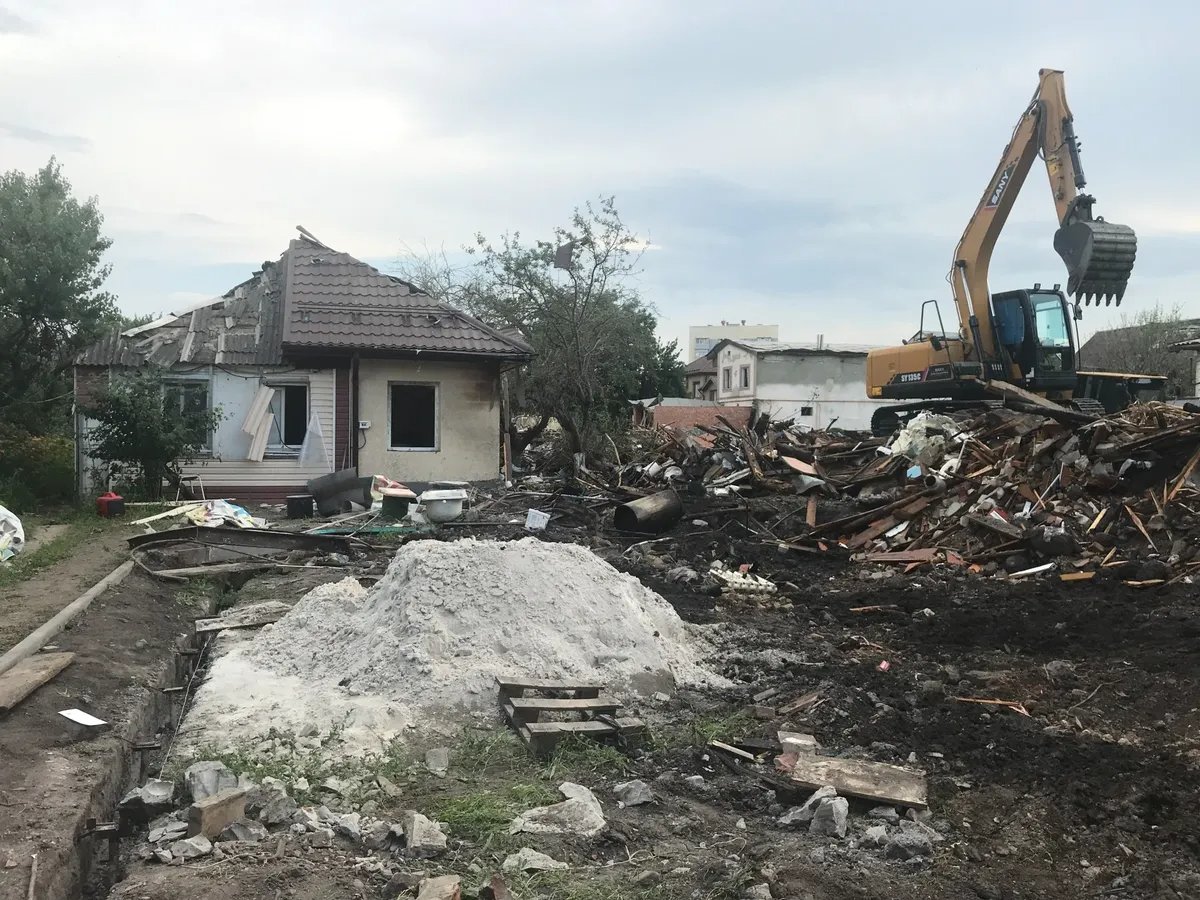
“I kept thinking this was going to happen precisely to me”
Window frames are stacked near trashcans in many courtyards around the site of the rocket strikes. Some people chose not to wait for assistance promised by the governor and are changing their windows themselves. Governor Vyacheslav Gladkov came up with a weird formula: the local administration would help people in restoring their housing based not on the damage caused to them but “depending on the residents' incomes.” And then he accused some city dwellers of ruining their property on purpose to cash in on the state. “Unfortunately, some have perceived this situation as a way to make repairs at the expense of other sources, breaking tiles and smashing windows,” said the governor.
According to the Belgorod administration's calculations,
a total of 33 apartment blocks and 70 single-family homes sustained damage, including 13 that have either been ruined completely or are damaged beyond repair, and therefore, will be pulled down.
The governor has promised that new homes will be built instead of these 13 buildings by October 15.
The roof of Venera's home has not yet been repaired. There is a hole in the ceiling right above her bed now, but she cannot move it on her own, and all of her relatives live far away, outside of Zhytomyr in Ukraine.
“I don‘t care about politics,” she says. “And I haven’t watched news programs for a long time. But it turns out that I’ve also suffered now. When those rockets struck, it was really scary: you just sit and wait for another bang, and you can‘t help thinking that you could be gone next second. And not only was I just thinking about that, but I also had some confidence, as if a gun were put to my head, that this was going to happen precisely to me. I had heard before that some areas were struck from time to time in our region, but I didn’t associate it with myself in any way. I didn't have such fear for my life. I did hear that people were killed somewhere. But now I feared that this would happen precisely to me.”
Olga, whose mother's apartment balcony was wrecked by a shock wave, says that she has been unable to fall asleep at night following the rocket strike.
“I can‘t sleep because of fear. Not during the day, but you go to bed at night, and you feel scared to sleep. When border areas came under fire, we didn’t think too much about it, but now we've seen that we can also be hit,” she says.
Eduard also lives in one of the apartment blocks near the rocket impact site. He was helping his neighbor take window frames to the trashcans when I stopped him to ask some questions. Eduard's apartment remained intact purely by chance.
“Perhaps everyone in the city was scared that night. And everyone is still afraid, too. After all, this shows that it can happen again,” he says.
How has fear changed Belgorod residents? Perhaps it has changed their attitudes toward the war?
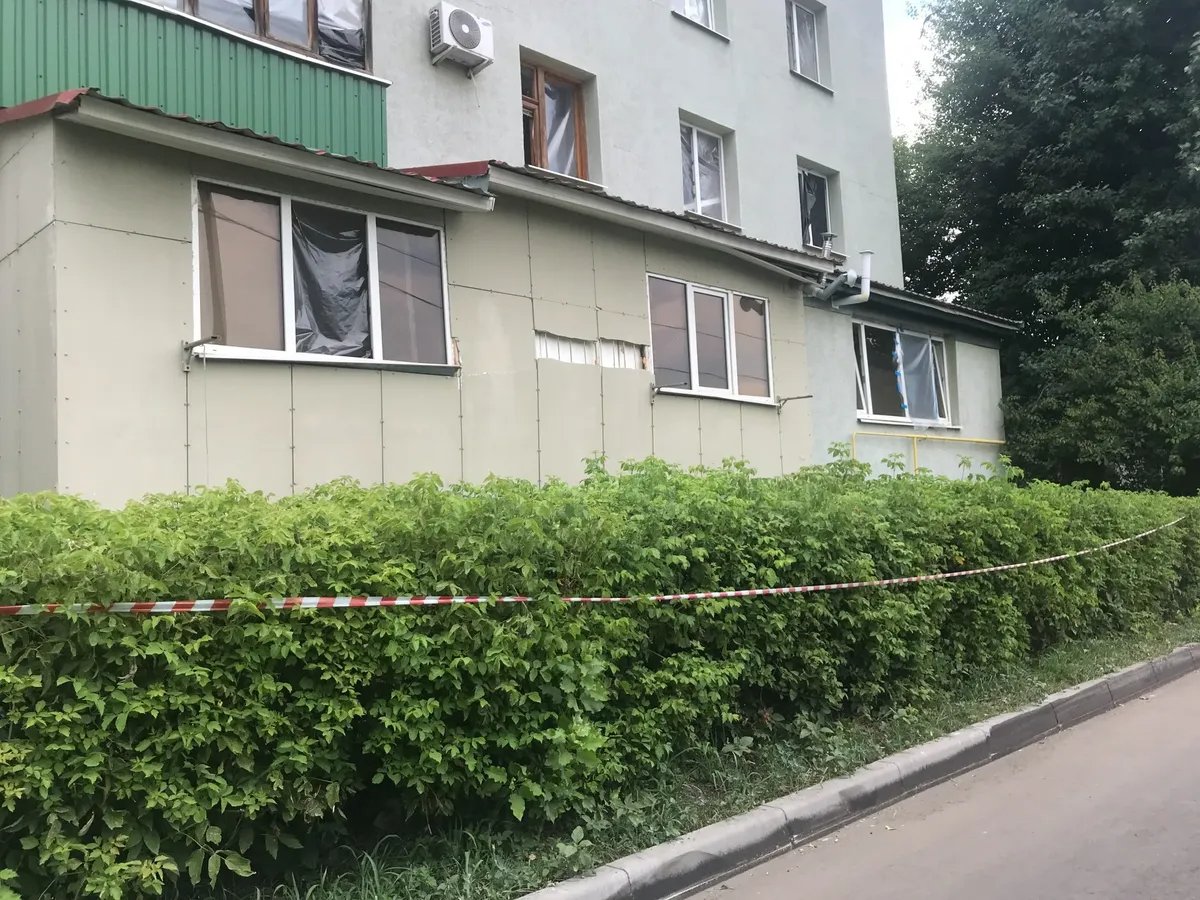
The house opposite the fall of the rocket. Photo: Irina Tumakova
“And everything would have passed much more smoothly”
Journalist Nikita Parmenov talks with people a lot in his city, which is his job. According to his observations, the missile strike upon the central part of Belgorod scared many people, and, as he sees it, divided them into several categories.
“Previously, only people from villages near the border suffered from those horrors. Some of their homes were destroyed, and several people were killed there. But you haven't felt anything like that in Belgorod until lately,” says Nikita.
Now some have been impressed so much as to pack and leave. Others keep living as if nothing changed. Yet others are demanding retribution and posting pictures with artillery rounds inscribed 'For Belgorod!' on social media.
“And there are also some who are staying in the city but cannot sleep now. They asked the governor how they are supposed to sleep. The governor replied: ‘Nohow’. You see? ‘It sank’,” Nikita apparently refers to Vladimir Putin's scandalous reply when he was asked what happened to the Kursk submarine in 2000.
Viktor Petrovich, a 90-year-old man, is sitting on a bench, putting his crutches aside, near a brick five-story apartment block, near the rocket-struck community of single-family homes. Early on July 3, he was also awaken by the 'bangs'.
“Our military overslept that! They knew it would come from Kharkiv! They should‘ve downed them right over Kharkiv!
If I were Putin, I’d wipe Ukraine off the map. The whole of it! Stalin wanted to exterminate Ukraine completely. And I wish he had!” says Viktor Petrovich.
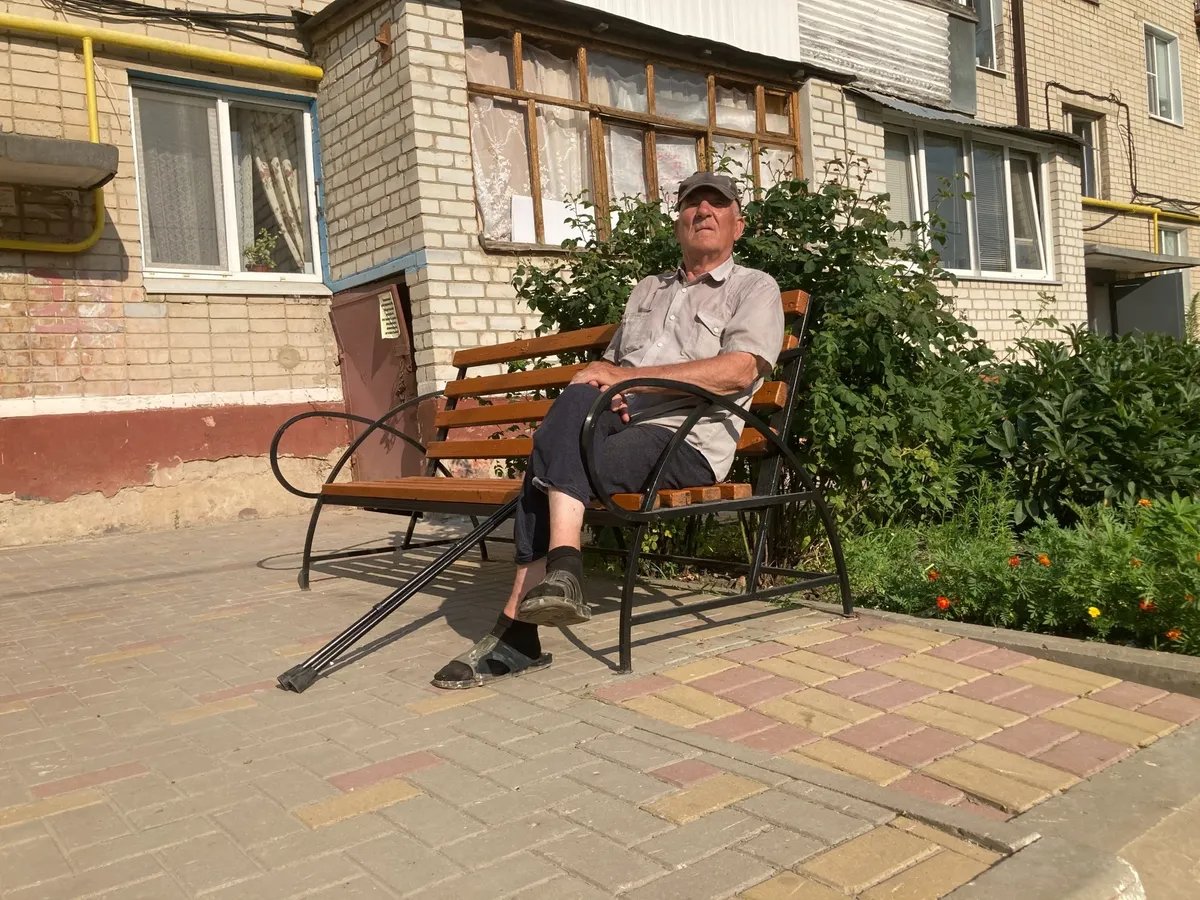
Viktor Petrovich. Photo: Irina Tumakova
“And Hitler wanted to exterminate Russia,” I remind him.
“And Hitler and Zelensky are the same. None of those countries who listened to America live well,” he replies.
Olga, hurrying to help her mother whose balcony was smashed by a blast, says she feels sorry for people wherever they are.
“But Ukraine screwed everything up itself with its Maidan. And all I want now is for the special operation to achieve its goals and conclude as soon as possible,” she said.
“And you know what its goals are?” I ask her.
“I don't care,” she shakes her head.
Eduard also feels “sorry for people wherever they are,” repeating word for word the phrase I heard from Olga, whom he does not even know. And then he continues as if he had also learned his role together with Viktor Petrovich.
“America is to blame for everything. They‘re supplying Ukraine. If Putin just entered with the special operation, demilitarization, and denazification, and the Ukrainians wouldn’t have defended themselves, everything would have passed much more smoothly,” Eduard says confidently.
“Is it right not to defend yourself when you've been invaded?” I ask him.
“Well, you know why they‘ve been invaded,” Eduard replies reproachfully. “Documents have been found that the Ukrainians were going to invade the Belgorod region on March 8. They were going to enter the Russian Federation through our region. And then there would’ve been an all-out war,” he says.
“And what is it now?” I ask.
“And now it's a special operation,” he answers.
Venera, who prefers “not to care about politics” even as the roof of her home has been broken, is feeling upset that her relatives in Zhytomyr have stopped speaking to her.
“My mom, my grandma, my mom‘s sister, and my cousins live there. We used to chat via Odnokassniki, but now they’ve been treating me differently for some reason. They hate Putin for some reason, and through Putin, they hate all Russians, as well. But why? There should be some reason, after all. And they‘re writing such nasty comments, calling us names… Can’t understand that,” says Venera.
Volunteer Yevgeny Bakalo, who devotes his time and his own money to help Ukrainian refugees, reasons that it is not Belgorod residents but the Russian Defense Ministry that should make conclusions from the incident. Which it has probably done already, he adds knowingly.
Antonina Nikolayevna, who has lost her home where she has lived for 50 years, says she has finally realized what it feels like when you are being bombed. Therefore, she says, the “special operation” should not be stopped halfway.
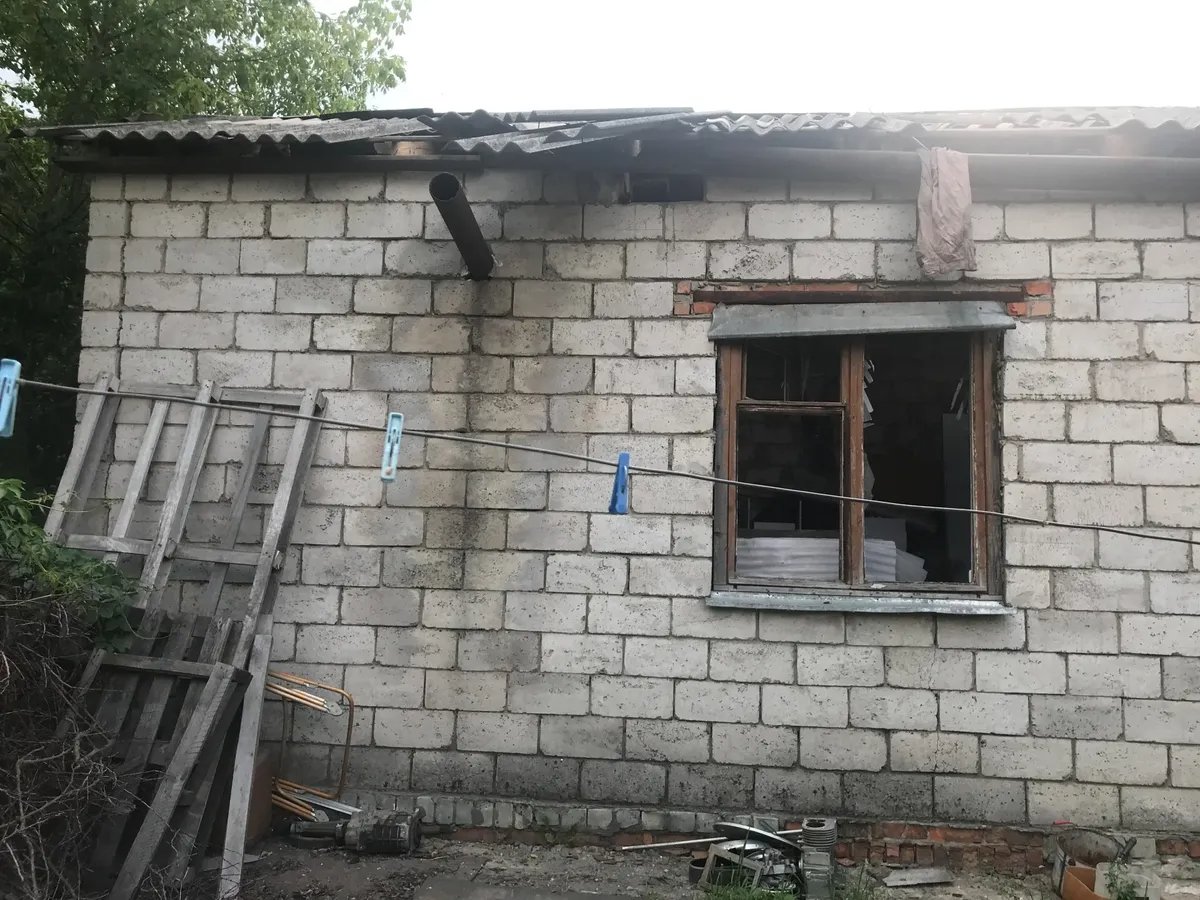
House on the site of Antonina Nikolaevna. photo: Irina Tumakova
“Once we started it, and considering how many of our guys were killed during the first days, should we really quit it? But what were we supposed to do? When it was revealed what they were plotting against us, we had no choice. Against whom were they arming themselves? Why did they set up those bunkers against us?” she says.
I am not aware what Ukrainian bunkers she were talking about and against whom they set them up, and so I was about to ask Antonina Nikolayevna that question, but her son Alexander joined the conversation first, saying that he judges about things as “a man who has served in the military.”
“I, for one, watch TV and analyze everything,” Alexander lights a cigarette, apparently preparing to make a speech.
“They keep saying ‘Bucha! Bucha!’ and bringing various foreigners there to show them where those crimes were supposedly committed. Did anyone repair at least one apartment for the people in all this time? And in Mariupol, as far as I can see, whole neighborhoods have already been built in the meantime!”
Of all the people I met in Belgorod who were affected by the missile strike this way or another, only Valentina Vasilyevna, who was taking her belongings out of her destroyed home and dreaming of finding a psychologist for her scared grandchildren, has said that her views have changed dramatically.
“I must admit I also supported all of that. I am Russian, and I am a patriot, and of course, I support my president.
However, I understood that, as long as the war continues, this may happen to anyone. Nobody can feel safe. It makes no difference for me any longer, whether it‘s Ukrainians or Russians.
Look at Mariupol: no stone was left upon another there. My husband and I will go to our daughter to live together with her, but where should those people go? And now I believe all of this needs to be stopped. I don’t know how he would stop all this, but it needs to be stopped, that's it,” she says.
While on a taxi, I had a conversation with the driver. I do not really like this 'conversation with a taxi driver' reporting genre, but Nikolai turned out to be quite talkative, saying that he once served in the military and was in retirement now, that he himself lived not far from Mayakovsky Street, and therefore, he feared for his family now. And that interested me. Then Nikolai said he had appealed to the local military recruiting station, asking for being recruited to serve in the Kramatorsk district military administration, but they would not interested, for some reason.
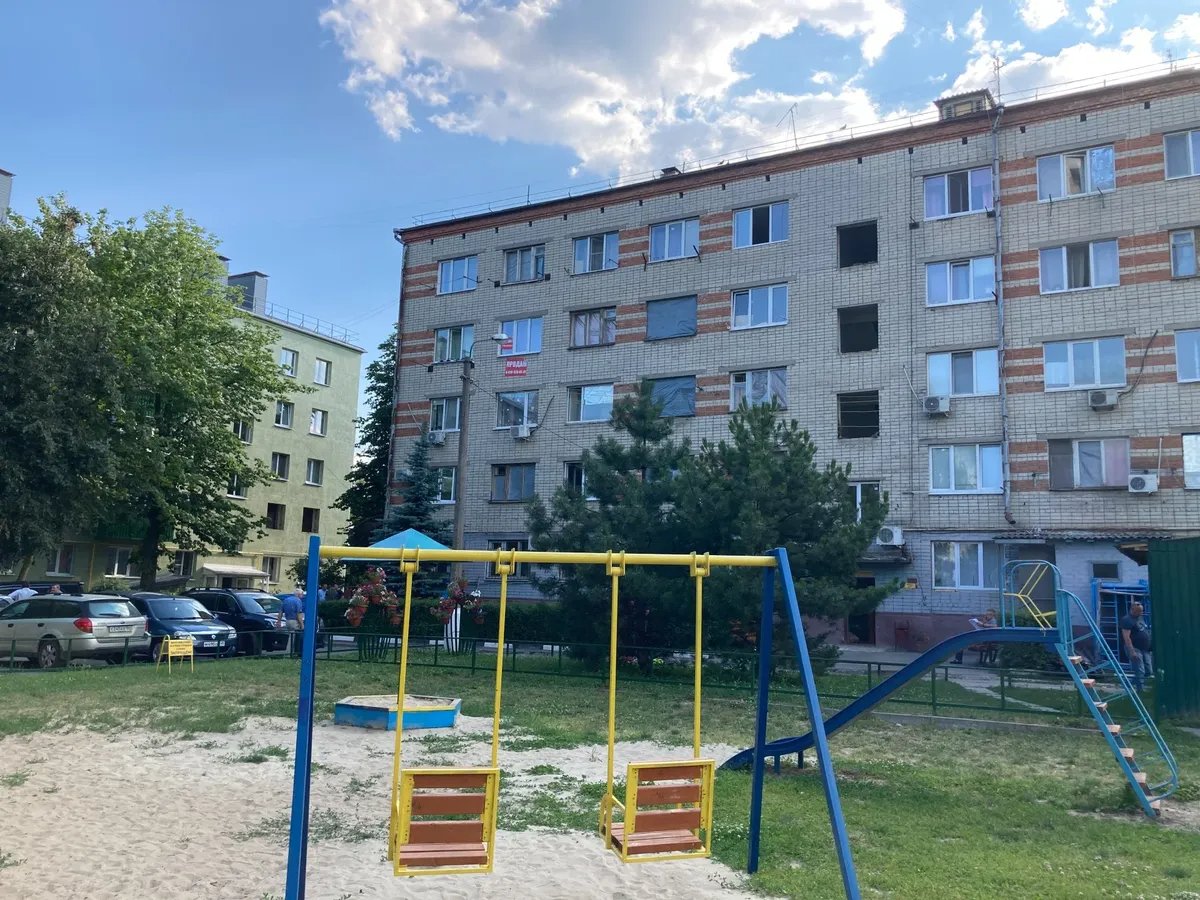
House on Mayakovsky street. Photo: Irina Tumakova
“Do you really think it‘s Russian troops who are firing rockets upon residential neighborhoods in Kharkiv?” He even turns to me, as if forgetting that he is driving. “Of course, not. That’s the Banderites themselves who are shelling homes. There are witnesses, I mean people who have come to us from Kharkiv.”
I was really eager to find out where residents of a Russian city closest to Ukrainians get their information about Ukraine from. And volunteer Yevgeny Bakalo introduces me to one of the refugees, Artem from Kharkiv.
“Total Russophobia”
Artem, a young engineer from Kharkiv with a clever pair of hands, is currently living in Yevgeny's home in Politotdelsky. He looks about 30. Yevgeny helped him buy a laser woodworking machine. Artem has started making various beautiful and useful things and is going to sell them. The volunteers whom Yevgeny has put together usually prefer to give their charges a “fishing rod” rather than “a fish.” In a couple of minutes, Artem carves for me a touching children's puzzle-like toy: you have to put together three bears, the mother, the father, and the bear cub, tenderly hugging each other.
Artem says he was a biker at home, in Kharkiv, and has actively supported the Anti-Maidan movement since 2014. And as all of his fellow-bikers, he was looking forward to 'Russia's arrival'. It never occurred to him simply to leave for his beloved Russia.
“I was waiting that we would wake up one day, and Russia is already here,” he says.
This joyful occasion happened on February 24. Russia “arrived.”
“I woke up and heard sounds of strikes,” Artem goes on to say. “But all of us had been waiting for that. People took to the streets at about 8 o‘clock in the morning. And none of them would say that Russia was doing anything wrong. I was in my neighborhood, it’s where the Kharkiv Tractor Plant is, I didn‘t go to other neighborhoods, but ours is very big. Women, I mean those who are 40 and older, would say they were going to pick flowers to welcome the Russian army. Everyone knew that everything would be over by the evening. A week before, they had collected service weapons from all police officers. You know why? Because they knew in Kyiv that, once Russia came, the city dwellers would lynch all the Nazis. And you know why people enrolled in the Territorial Defense in Kharkiv? To receive weapons, wait for the Russian army, and move on together with it. And when Russian Tigers entered the city, many were happy. And the Tigers behaved very politely. They would stop at intersections, didn’t obstruct anyone, and regulated the traffic. And we knew that Russia was about to finish them off outside of Kyiv.”
Then, for some reason, everything started going not as “everyone expected.” Even Artem himself did not welcome the Russian army with weapons in his hands. And then, he continues, Ukrainian Nazis started shelling Kharkiv with Grad rockets.
Truth be told, for some reason, it was shelled from the side of the DPR and Belgorod, but Artem knows for sure that Nazi battalions were doing it. Friends told him how “a fifteen-story building collapsed” right before their very eyes.
“Well, people see everything, after all. Russia came, it was welcomed so warmly, and then houses started falling all of a sudden. People can‘t understand anything. This is how it all started: Russia is supposedly to blame for everything, it’s Russia that is shelling everyone,” he says.
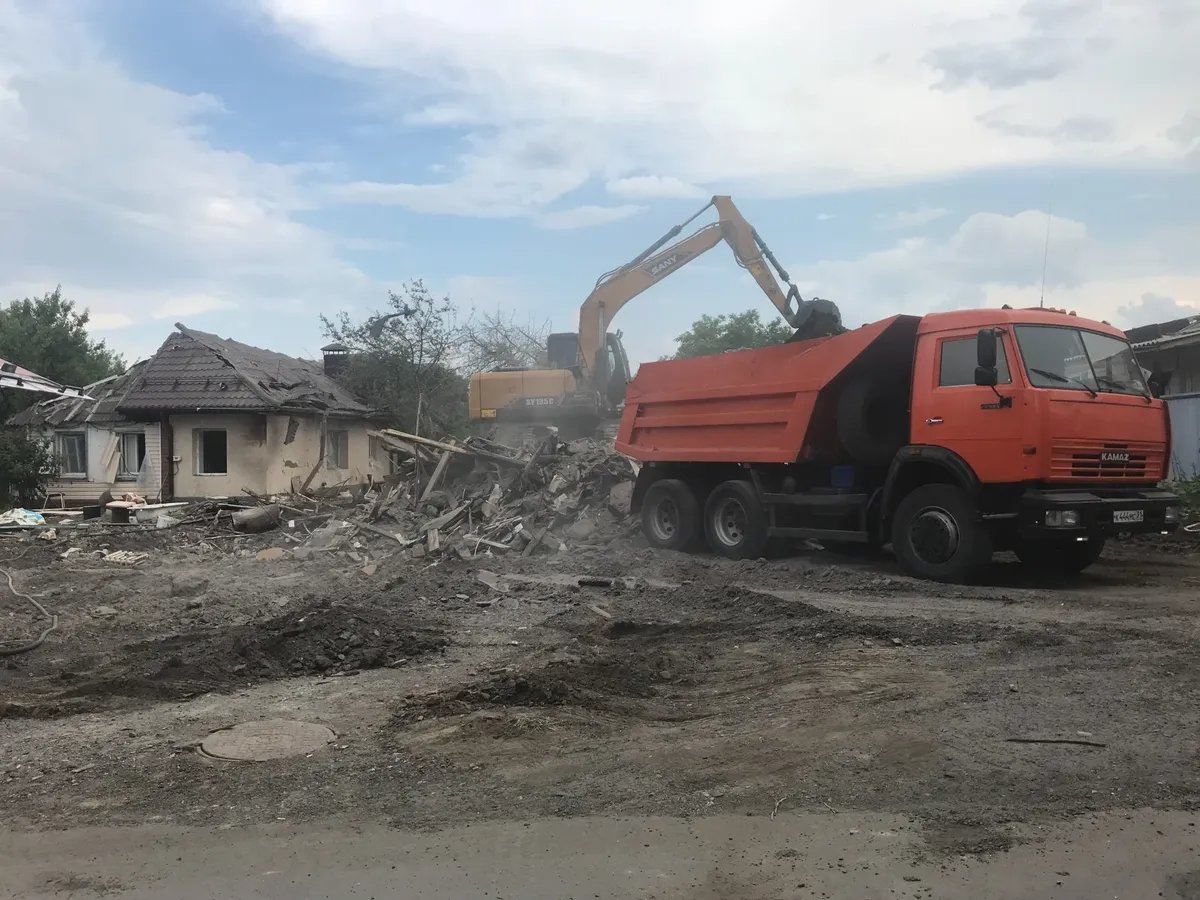
Demolished houses. Photo: Irina Tumakova
At the same time, Ukrainian army to the northwest of Kharkiv started firing at two or three peaceful Russian Tigers that approached the city. And then, Artem says, Ukrainian “battalions” came and took away his Ford for their needs.
“No matter what some might say, the Russian army does not act like this. The Russian army doesn’t take anything away from anyone,” says Artem.
“And doesn’t mail anything home then,” I add.
“Definitely,” Artem nods seriously.
A month later, on March 23, Artem put his fiancée Anya and his cat into his old Volga and headed toward Russia from Kharkiv, picking up an unknown elderly woman with a little girl along the way. Their travel was long and hard. As they were driving, their Volga was fired upon by 'Nazis', whom Artem identified by their camouflage uniforms. He shows me bullet traces in the car's body, but all I see is banal rust on the old metal. Then he shows me a hole in the license plate. But if that was really a bullet, it went precisely through the hole used to affix the license plate to the car. An inscription on the Volga's rear windshield says: “We won't leave our guys alone.” There is also the St. George ribbon attached to the side-view mirror. And even though it does have a Ukrainian license plate, it is easy to guess what the presumptive shooters might not like about that car.
The whole month that Artem had to spend in Kharkiv in the presence of polite Russian tanks, he says he was unnerved not so much by shellfire and the need to hide in a basement as by “the multitude of troops.” Implying Ukrainian ones.
“There were so many of those strange battalions. Nazis, shall I say,” he says.
“Why do you call them Nazis? How do you see who is a Nazi in Ukraine?” I am asking him questions that have bothered me since February 24.
“They have a Nazi ideology. It's been such from the very start,” he answers.
“Nazism is quite a concrete ideology. How is it manifested in Ukraine?” I keep pressing him with my questions.
“Well, you certainly understand it. Don‘t you know, really? This is the idealization of one’s nation. This is superiority over others,” says he.
“And what actions is it reflected in?”
He ponders over my question for a while.
“Very definitely. They're really fostering some Hitlerjugend. This concerns orphanages, schools, and entertaining events held precisely under Nazi patronage. This also concerns salutes, symbols, books, teaching aids, and so on.”
“What kind of salutes in particular? What ideas do those books and teaching aids promote? How do you see that the symbols are Nazi ones?” I go on to ask him.
Artem muses again, folds his arms across his chest, and plucks at a ring on the middle finger of his right hand. The ring bears an image of a wolf paw print.
“Ideas… There are certain ideas,” he nods following a pause. “I have no relation to those organizations, though,” he adds.
“Have you ever heard of the Young Army movement existing in Russia?” I ask him.
“Don't know, never heard of it,” Artem admits.
We keep speaking this way for about twenty minutes, and yet I could not grasp the idea of Ukrainian Nazis.
Artem considers himself a Slav, a Russian man, “even if purely in appearance.” To my remark that his curly forelock looks absolutely Ukrainian, he reacts with a nervous giggle.
“Well, that‘s all of us… All of us are of the same species. If it’s about ideology, it‘s about Kh’Aryans, Da'Aryans, Svyatorussians — that all is deeper [a theory of the so-called Slavic race],” he replies.
“We don't even have anyone to talk about that…”
I'd repeat that nearly everyone in Belgorod has relatives on the other side of the border. This war has ruined these ties if not forever, then for a very long time. And what matters is not even who supports the war and who is opposed to it here, or who believes in Mariupol razed to the ground and who in Ukrainian Nazis. The war has ruptured ties even between those kin who think the same way. I have heard such a story from Yakov, a doctor in Belgorod (this is not his real name, for otherwise he would be unable to keep working there).
"My cousin lives in Kharkiv. We have been very close since childhood, my cousin is three years older than me, his father is my mom's brother. Our common grandmother and grandfather lived in Shebekino, which is some eight or nine kilometers away from the Ukrainian border. I would travel to Kharkiv regularly when I was in school and later in college, to see my cousin or just have some fun. Kharkiv is a beautiful city. Later, when I started working as a doctor in Belgorod, my colleagues and I travelled to Kharkiv several times to conferences, and we were always received very warmly there. And those meetings were also very interesting from the academic standpoint. My impressions from Kharkiv were always excellent. On weekends, my whole family often traveled there, I mean my wife and kid, and sometimes my parents, as well. Those always were full-scale weekend tours, including a cultural program in the city, shopping, meetings with relatives, with whom we stayed overnight, and then we returned home.
"We felt some change in 2014. My wife and I landed at the Kharkiv airport when we were on our way back from vacation, and we were just in time to leave for Belgorod when all those spring 2014 events began. Anyway, my cousin and I still remained in touch, but our relations were not that close any longer, if only because I was unable to visit him.
"On February 24, I was on a business trip to Moscow and was supposed to be returning to Belgorod on that day. I switched on the TV in the morning and saw Putin's address. I remember that feeling around me: I went down to the subway, and it felt like a concrete slab hovering in the air. I admit that I might've been the only one feeling that way.
"My flight was cancelled, and I had to return to Belgorod by train. I called my cousin from the train. He told me: that's true, there's gunfire and blasts around. My cousin said a Grad round was lying in the yard of his apartment block, and a few cars were damaged. One of his phrases, which he uttered kind of jokingly, is etched on my memory. For some reason, we were still able to joke at the time, perhaps not fully realizing what happened.
“You now, Yasha, now you‘re going to invade us, and then we’ll finally meet up,” he said. Those words made me shudder. “How could've that happened? Who can invade whom?” I thought.
"After that, we texted each other every day. They were shelled all the time. Then he took his family somewhere to the countryside to stay with his friends. He told me how his children go down to the basement every time an air raid siren sounds. He said it's very hard to live with that fear. We couldn't tell a lot to one another, we felt all the time as if there were someone's ears around.
"And he and I even thought more or less the same way. I followed the news. Of course, I am not talking about official Russian news sources. I've been opposed to this war. I even ended up being unable to fall asleep. I would take sleeping pills at three in the morning, because I cannot feel sleepy when I receive patients.
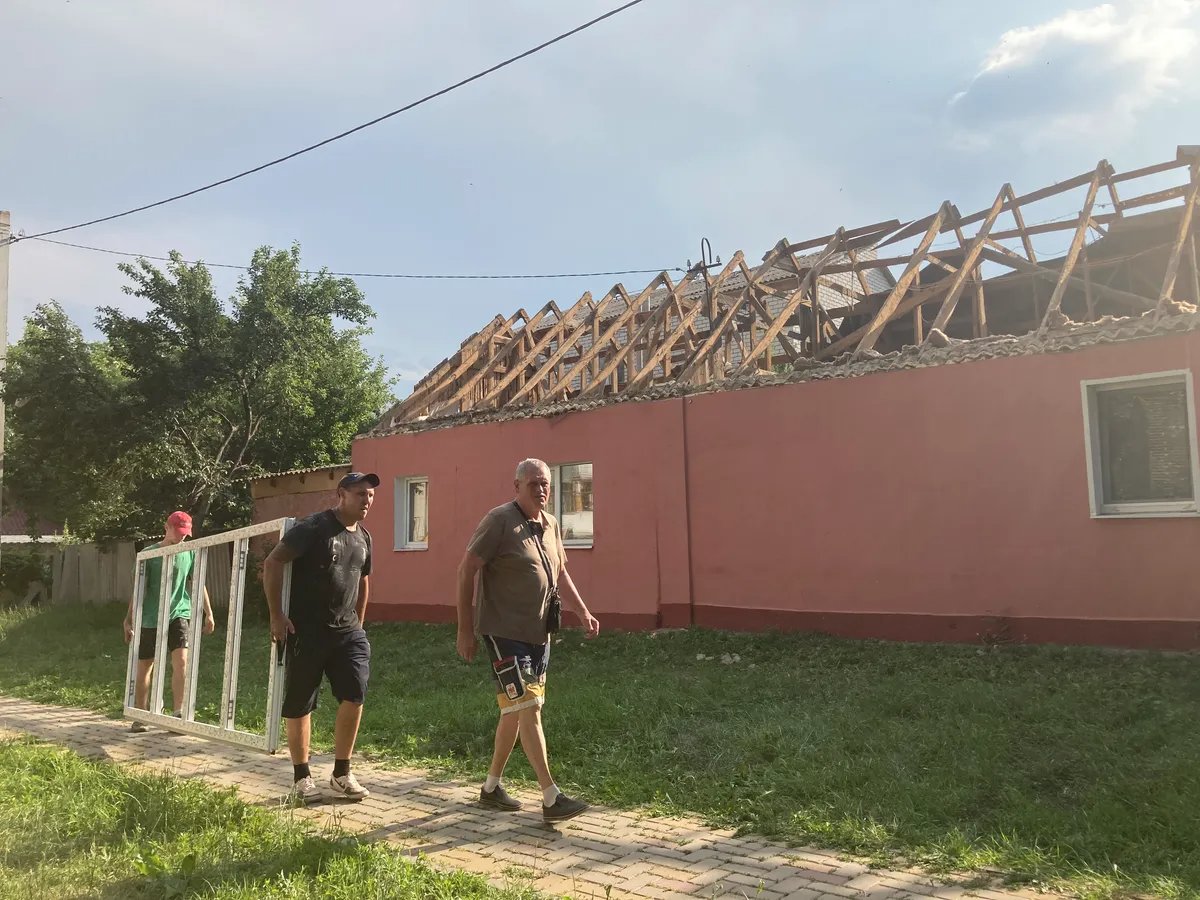
This house has been restored. Photo: Irina Tumakova
"Then my cousin's tone started changing gradually. He began telling me things like 'your men are hammering ours', or 'you've lost that many people in that battle'. He knew I am opposed to the war, and yet I became one of those 'on the opposite side' for him. He would say: You've retreated, but you're still pounding Kharkiv. He had actually provided for both his family and his parents alone, but he lost his job, because the place where he worked was smashed, and his job doesn't physically exist anymore. We're trying to help them somehow, and we have engaged our friends in Germany to transfer at least some money to them via different routes. And at the same time, I see how my cousin has been gradually viewing me as someone 'on the other side.' Even though he knows my position.
"My parents are pensioners, they live in Belgorod, and they get all information from television. My mom and Nikolai's father didn’t even try to find a common ground. Mom's head is filled with official information from Russian TV, and her brother's from Ukrainian media. They've become absolutely incompatible. No, nobody has disowned anyone within our family, although we know a lot of such stories around us. We've simply limited communication. After Kharkiv was shelled especially hard, when there were numerous civilian casualties, Mom called her brother and told him: You're being shelled by your own troops, that's what TV says. You can imagine what her brother replied. They quarreled then, and yet they tried to continue communication later.
"You know why I agreed to talk to you? Both my wife and I are doctors. We have just a few colleagues who say they think the same way that we do. And we don't have anyone even to talk about that, because everyone is afraid. We are even afraid to speak with each other now. But it feels like we can't keep silent anymore.
"When downtown Belgorod was struck, what happened to us afterwards probably was the last straw for me. I thought this would open our people's eyes to the fact that we've had just one strike, but imagine what people in Ukraine are through now. But my parents still can't understand that. They say: We only shell military targets in Ukraine, while the Ukro-Nazis strike our civilian homes. My mom and dad didn't even worry that the same might happen to them, as well. After all, we can often hear Russian artillery banging. And a relative of us living outside of Belgorod, also a doctor, said recently: They didn't fire yesterday, and so I couldn’t fall asleep at night, and when our military fires, I sleep very well. You see? They feel safer when Russian artillery shells Ukraine.
"And my mom's brother called her after Belgorod was shelled to say: that strike was a provocative act, the Ruscists are shelling themselves on purpose. My mom and my uncle have become very estranged now.
"Again, I don't support any of this, and my cousin and uncle know this. I actually can't understand how all of this can be happening. Perhaps this is why we can still speak to each other at least somehow. But the abyss between our families is growing wider and deeper from day to day.
“That is why I am telling you all this. That‘s the policy of our authorities: they set apart even people who think the same way. Whether we want it or not, but even being very close and thinking alike, we are still on the different sides of the frontline. I don’t know why they're doing this to ordinary people”.
Join us in rebuilding Novaya Gazeta Europe
The Russian government has banned independent media. We were forced to leave our country in order to keep doing our job, telling our readers about what is going on Russia, Ukraine and Europe.
We will continue fighting against warfare and dictatorship. We believe that freedom of speech is the most efficient antidote against tyranny. Support us financially to help us fight for peace and freedom.
By clicking the Support button, you agree to the processing of your personal data.
To cancel a regular donation, please write to [email protected]
